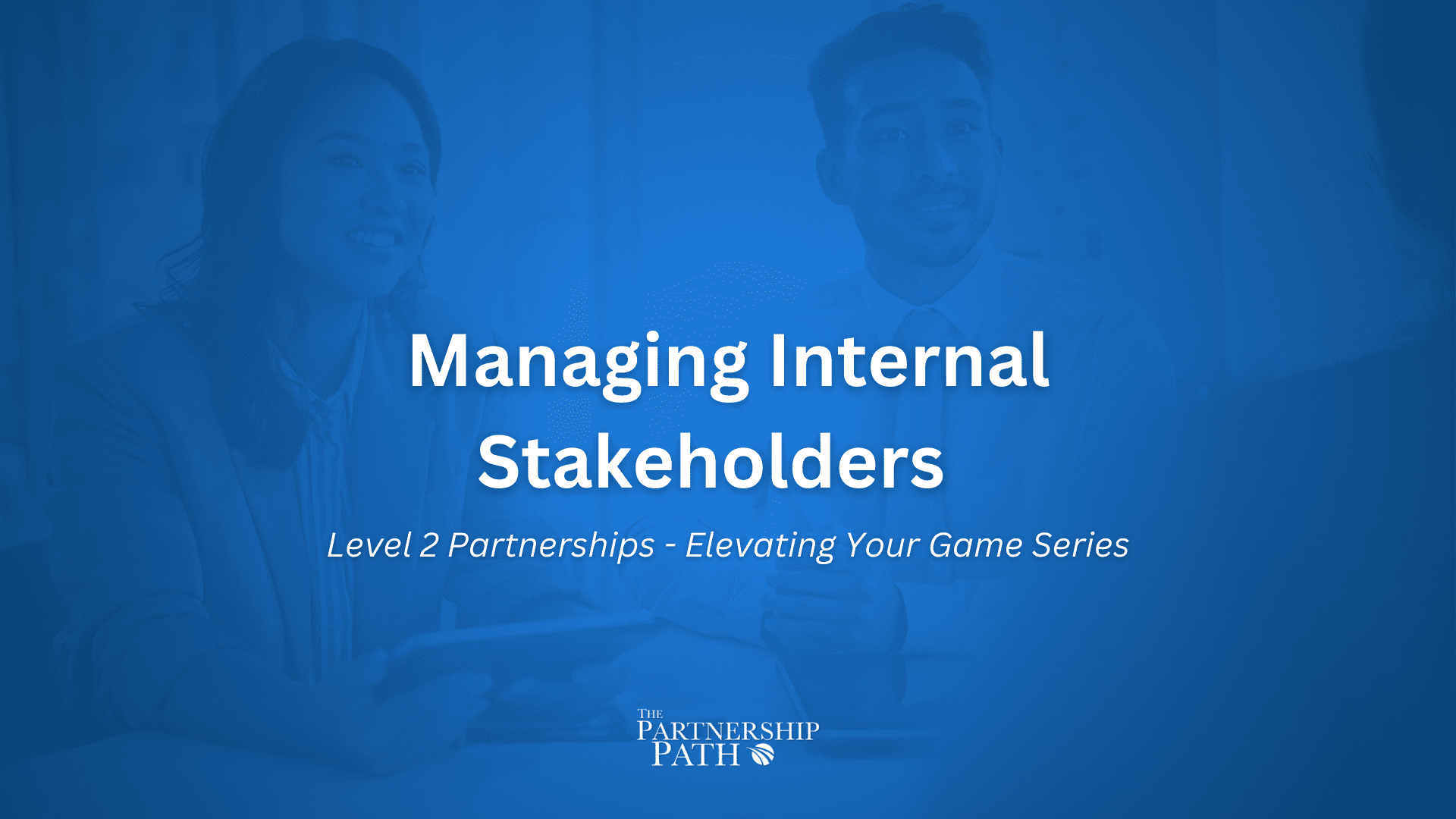IRL Episode
Driving Organic Growth with Julian Cassell at Infor
Episode Summary
In the world of business partnerships, the key to unlocking sustainable growth lies in understanding the intricate dynamics between partners. In this engaging episode of The Partnership Path in Real Life, host John Rudow welcomes Julian Cassell from Infor to discuss the strategies that can drive organic growth through effective channel partnerships.
Why should you care? Sharing this insightful conversation can empower business leaders and partnership managers to rethink their approaches, ensuring they cultivate not just profitability, but genuine collaboration that propels long-term success.
Julian’s extensive experience—over nine years managing channel partners in the UK and a strong sales background—provides an invaluable perspective on what makes partnerships thrive. His insights into identifying a partner’s true appetite for growth and avoiding common pitfalls can save you time and resources, ultimately boosting your bottom line.
Transcript
John (00:01)
Well, hello, everybody. Welcome to another episode of the Partnership Path in Real Life. And Julian, I am so excited to have you on the show with us. really appreciate you taking the time to join us today. But before we get going, let me give you a chance to introduce yourself to our listeners. Tell us a little bit about who you are, what you do. I mean, gosh, how long you’ve been working with partners.
Julian (00:23)
Hi John, really good to meet you. As you say, my name is Julian. I work for a company called Info and I’m responsible for looking after 21 actual channel partners in the UK. Quite a few there, so you can imagine the work that’s involved in doing that. I’ve actually worked for a company called Pegasus who are part of Info and I’m coming up to nine years in the role now.
John (00:36)
Ouch. Yep.
Nice.
Julian (00:53)
And I think what’s looking at the topic we’re discussing today, I think what’s been useful is probably for 15, 18 years, I’m getting older, I actually worked in sales, which has been very, very beneficial and also selling the product that I’m responsible for looking after with the partnerships. So that’s been very useful for me.
John (01:02)
yeah.
Yeah.
Yeah,
super good point, Julian. think having a sales background when you come into this role makes you that much more effective, right? Because you kind of understand a little bit better the people you’re trying to coach and help in the partners get their job done. Yeah. Well, listen, so today we wanted to talk about organic growth. Tony and I just did this episode on driving partnership organic growth. I know you listened to the episode. That’s why you’re here.
Julian (01:28)
Most definitely, most definitely, yeah.
Check.
John (01:44)
Tell me what resonated for you in that episode or what kind of stood out for you as kind of helpful or things you’d want to pass on.
Julian (01:52)
There was a number of things to be honest, but the first one is really taking it back to the beginning. In terms of my role as a channel partner manager, the end goal is to grow my business. In terms of software, license sales, it is to grow that year on year. And obviously there’s pressure on me to do that. When I first started as a channel partner, and it’s very different from being a salesperson.
And I don’t think you realize that when you go into the role of a salesperson. I was good at that, so I’ll be good at this. There’s quite a big learning curve to become a partner manager. So I went in, 20-year-old partners, I’ll go and introduce myself and go, I need to grow, go and sell that. And of course, what you hear is, yes, we’ll do that. We want to impress you. We’ll promise you that. And what you tend to do, because I haven’t analyzed anything,
John (02:21)
Yeah.
Yeah, yeah.
Julian (02:51)
I haven’t built relationships, I don’t know their business, I don’t know anything about them. Literally day one I’ve gone in and said, sell this and they’ve gone, okay, and that’s it. And probably for two years I probably did that and didn’t get great results because you believe them. Yeah, you believe them. You fall for their talk going, yeah, we’ll grow that. We can sell that, we’re really good at that. We’ve got all the resources we need and…
John (02:51)
Yeah.
Yeah, shocking.
Yeah. Yeah. Yeah.
Julian (03:20)
then they don’t. And then you’ve got a problem. So I think the key thing was to understand the partner that you’re working with and build that partnership in fairness through the whole process. And get to know those people, get to know the companies. Are they capable of growth? There’s no point wasting time if they’re really not capable. Do they have the appetite for growth? Do you know what?
John (03:42)
Yeah.
Julian (03:49)
not every company wants to grow. They’re quite happy sat there doing what they’re doing because they’re good at it and it’s easy and there’s no challenge and you don’t have to make any more investments and things like that. And you’ve got to understand all those parts of that business before you can actually sit down and go, right, I want you to grow. And don’t sit down with the people who are not going to grow. Don’t waste your time. I’ve spent weeks and weeks and weeks doing that thinking I’ll get the result and I didn’t.
John (04:15)
Yep. Yeah.
Well, talk to me a little bit about what that looks like for you. So when you say getting to know the partner, trying to figure out whether they have an appetite for growth, how do you do that? Like, you know, how do you figure that out? Right. Because you got these people very often who are telling you what you want to hear. So if we’re going to drive that organic growth, how do we figure that out?
Julian (04:43)
It’s getting to know them. They are going to tell you what you want to hear to begin with, but it’s a certain people in the business. You’ve got to make those key relationships and build those key relationships and get a full overview of that business. Because someone might say that, but then if you’re speaking to the salesperson, the sales director is always going to say, yes, we’ll grow, we’ll grow. But if the managing director or CEO is not interested in that area, there’s no point in doing it.
John (04:56)
Yeah. Yeah.
Julian (05:10)
So it is a case of sitting down with all the stakeholders, getting their side of the story and where they’re going in the next five, 10 years, however long, they want to do and whether they’re interested. But it is definitely talking. I think the whole process is about talking with the partners.
John (05:24)
Yeah.
Yeah, trying to kind of sift through what they say, right? Like I think, as you sort of mentioned, I think there’s a lot of, especially in the reseller channel, right? There’s a lot of managing directors, company leads who think they want to grow. Like they’re like, yeah, hey, I’d like to grow.
But that’s almost the wrong question, right? It’s not really, you want to grow? It’s really, are you willing to invest to grow? Are you willing to put in the time and energy and money to grow? Because it’s okay if you’re not, but let’s be honest with each other. And so I think sometimes maybe we even ask the wrong question.
Julian (06:15)
I think the other issue, the other thing you can do is oversell as well. When we come on to the evangelizing and selling part, which I’d like to think I was good at. So it is quite easy. If we have a new product or an add on for a product and I’m going in there to talk about that, I can sell that. You’ve got to have the facts. So you’ve got to turn around and say, this will bring X amount of pound notes or dollars to your business. If you do this.
John (06:21)
Yup.
Yeah.
Julian (06:45)
But the other side is that what do they have to do to be able to do that? And you’re right, they’ve got to turn around and say, yeah, we’re willing to do that. I’m willing to invest. I will take on new marketing people or pay for advertising or something like that. So if they don’t do that, it’s never going to work. You’re going to fail.
John (07:02)
Yeah, know, Julian, you you keyed in on one of my favorite parts of this topic, which is this whole idea of presenting to them a business case, right? That that I can’t I can’t just come in with my product and say, hey, sell this product. Hey, look how great this product is. Look at all the things this product does. Right. I’ve got to actually come in and say, hey, look, here’s here’s the market where this fits. Here’s the.
market, the addressable market that is currently not being serviced that you could go after that we have a reasonable expectation to capture. And here’s how that translates into dollars for both you and me. So what does that look like for you? How do you do that? Like that all sounds really great when I say it, but when it comes down to having that meeting with the partner, right? Like how do you know what’s your what are some of your techniques you you know?
How much of that do you sort of chart out? you, I don’t know, is it an Excel spreadsheet, a PowerPoint? Like, what do do?
Julian (08:05)
It’s more of a discussion to be fair. If we’re talking figures, I will go through and say, one of the easiest ways of organic growth is to look at the current customers and sell more to them. Easy.
John (08:07)
Yeah.
Right. Right.
Just for those for those people who
aren’t watching the video that was a pretty big eye roll for you on an easy. Yeah
Julian (08:29)
It was, it was.
But it’s a case of you can turn around and say, look, you’ve got your customer base there. If you sell, upsell this product, which has been available, you’ve had training, you know it. But I noticed statistically, you’ve got 100 customers, 60 of them don’t have that functionality. You go and sell that, that’s worth X amount. That will mean this amount of dollars or pounds to your business.
Once you add that up, eyes widen and people start smiling and go, that’s pound notes in the bank. Yeah, so we can do that. And to be fair, it’s the easiest way of growth. I think it’s quite short term. Because they’ll do that, you run your campaigns, you get the marketing done, they sell it, and then you go, well, they’ve done that for six months or a year, and now what are they going to do? So I think one of the other points I picked up and the way I look at it is,
John (09:10)
for sure.
Julian (09:26)
We look at multiple ways of growth. You can’t just concentrate on short-term one, which I think that is. And then you perhaps look at something more challenging and requires more investment, which may be a different market sector or a different vertical or geographical area, something like that. So you work on that as a side as well. But it is a case of going in. The other thing I’ve got, obviously I’ve got 21 partners. Some are a lot better. Some are not so good.
So if you’re speaking to the middle ground, that you think, yes, they have the resources, they have the appetite for growth, you can actually use case studies, examples of how it’s worked for those successful partners. And there’s a bit of competition, so I’ll know who those partners are, and there’s a bit of competition between them. go, well, if they can do it, we can do it. And I tend to use that leverage quite a lot, to be fair.
John (10:18)
Yeah.
Yeah, I’ve got to, you raise a question for me. I’m curious what your experience is, especially given the size of the portfolio that you have. When we talk about those more difficult growth styles, right? To go into a new market, a new geography, a new industry, whatever it is, it strikes me that I can bring a, can, as in for,
you can bring a set of data to the table potentially that says, hey, look, here’s what we think the market looks like. Here’s what we think is available out there. It’s not something you are necessarily familiar with, Mr. Partner, but here’s what our research shows. It strikes me that one of the tests that might inform us whether the partner is willing to put in the effort to grow
is whether they go do their own research to validate whether what you’ve brought to the table is accurate or not, right? What’s your experience with that? Have you seen that? Do you agree with that? Does that feel like the right kind of test?
Julian (11:24)
Yes.
To me it would be great if they did do that. I mean obviously what I’m telling them is the truth anyway. But yeah, if they’re serious they need to go and get the stats and the figures themselves. And that has happened. That has happened. It doesn’t always happen. Sometimes, again, I’ve come from a place of selling the product and working for a partner that I never look after. So there’s a lot of trust.
John (11:39)
Of course, of course.
Julian (12:00)
they trust what I’m saying and things like that. it is good that they evaluate and they actually fully grasp and understand their own thinking and their own.
way that they will go to market or take on the challenge of a new product or a new geographical area by looking at the figures themselves.
John (12:20)
Yeah. You said something early in the conversation about whether a partner is even capable of growth, which I think is different than someone kind of wanting or having the desire and even the willingness to invest. Because you could have someone who wants to invest, but their kind of operational structure isn’t capable of growth.
Julian (12:46)
Right, yep.
John (12:48)
What’s your experience there? Like, what have you seen there and how do you fair it that out?
Julian (12:53)
That’s quite common to be fair that I see. I think that that’s part of the conversation you have with a partner. The first thing is are they willing, do they want to grow? Are they interested? But then you have to sit down and you know some harsh truths sometimes because these partners may think they’ve got everything they need to.
to go and take over the world, but in reality, it happens. And yet you need to sit down with them and talk through those different areas, be it sales, marketing, delivery, support teams, things like that. And you have to have that conversation with them. They may have plans, they may say, that’s fine, we will recruit X number of staff, or we would take on a little bit of software to manage these processes. But they’ve got to realize that, yeah.
they’re deficient in areas as well, if they are.
John (13:48)
Yeah. Yeah. Yeah. there’s, look, think, there, there’s a lot of, in this, in this particular segment, a partner we’re talking about, there’s a lot of businesses out there that, have grown their business kind of organically, but, but within, kind of bootstrapped, right? Like, so they, so, so they don’t, they’re not taking out big loans or anything, right? They’re, they’re actually paying for their own growth kind of a thing. And
Julian (14:13)
Uh-huh.
John (14:18)
they may or may not be super good at understanding what kind of an investment it might take to, for example, open up in a new geography, right? The idea of, wait, I’ve got to hire salespeople who I’m not going to see every day. I’ve got to hire delivery people who may or may not be in this office that I’m in now or in this local area that I’m in now. There are costs associated with that that I think a lot of times
Julian (14:39)
correct.
John (14:45)
partners don’t necessarily think about that we have to help educate them on. So I think part of our job too is education on how some of that works.
Julian (14:48)
very true. Yes, yeah
that’s the thing once you’ve sold them the growth plan, they’ve to educate them how they’re going to do it. They’ve agreed to it at that point and so then it is the education so you will need X number of staff and they may be here and maybe there as well as the education on the product and the things like that as well.
John (14:57)
Yeah.
Yeah.
Well, listen, Julian, we try and keep these to about 15 minutes and we’re at that time. So I’m going to start to wind this down. Let me just give you one last opportunity here. there any, look, the theme that’s kind of been through our discussion today is this whole idea of transparency and, really getting at the truth of what the partner can and can’t or is willing or isn’t willing to do.
Julian (15:21)
my fake plate.
Yes.
John (15:38)
Is there any last piece of advice you’d give our listening community in terms of kind of having those organic growth discussions?
Julian (15:47)
think the key thing is what I’ve said really is don’t push through the process. Don’t force it. Yes, I need license sales, I need sales figures to give to my boss and to hit my target, but don’t waste time in the wrong places doing them. I think it is having your facts so you can present and evangelize and sell. You’re selling those opportunities to the…
John (15:53)
Yeah. Don’t force. Yeah.
Julian (16:17)
to the partners.
John (16:18)
If I’m Yoda, you just said, choose wisely, and then you’ve said, and do your homework. So choose the right partner, and then make sure you’ve done your homework. I love that.
Julian (16:27)
Yes.
100 %
John (16:33)
Well, Julian, thank you so much for coming on an in real life episode. I really appreciate your perspective. I appreciate you sharing some of their, both your ideas and where you struggled. cause everyone’s got those. So it’s, it’s kind of nice to hear someone else has had that struggle. So I really appreciate you sharing that with the listening community and, I look forward to having you back on another episode sometime.
Julian (16:54)
Thank you John, thank you very much.
Key Takeaways
- Building trust and understanding your partners’ business is essential for growth.
- Focus on data-driven strategies to present compelling business cases.
- Utilize successful case studies from other partners to inspire motivation and competition.



